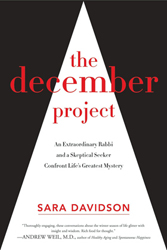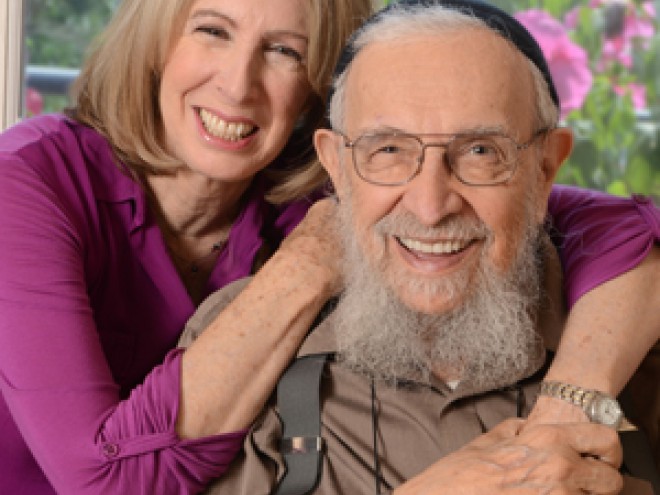Earlier this week, NY Times best-selling author Sara Davidson wrote about she came to write her memoir The December Project (HarperOne), which is based on her conversations with Reb Zalman Schachter-Shalomi about how getting “up close with mortality” quickens our ability to relish every day. She will be blogging here all week for Jewish Book Council and MyJewishLearning.
 “What should you do if your parent is close to dying but doesn’t want to talk about it?” I asked Reb Zalman Schachter-Shalomi, founder of the Jewish Renewal Movement.
“What should you do if your parent is close to dying but doesn’t want to talk about it?” I asked Reb Zalman Schachter-Shalomi, founder of the Jewish Renewal Movement.
I’d recently moved my 94-year-old mother to a care home for people with Alzheimer’s. She’d made funeral arrangements years before, but she never spoke about the elephant in the room — her approaching death. I wanted to know what she was experiencing. Was she in denial or at peace? What could I do to help her meet the inevitable with grace and love? I couldn’t just blurt, “Mom, you’re dying. How does it feel?”
Reb Zalman raised his hands as if to say, stop. “You don’t have to tell her she’s dying. Just sit with her quietly and think about it. She’ll be going to a different place and you’ll be missing her. You want to make the parting good for her and good for you. The message will seep in. Not everything has to be verbal.”
We had this talk during one of what I called my “Fridays with Reb Zalman,” when we met every week to discuss “The December Project.” Reb Zalman had written the book, From Age-ing to Sage-ing, in his sixties — the September of his years. Now, he said, it’s December, and one of his priorities is to help people caring for elders understand what they’re going through and what they need.
“The most important thing to realize is: this is not about you. It’s their life, their passing, and you need to find out how they want to do it, not how you think would be best,” he said.
It’s also time to let them fulfill their wishes. “If people want to eat a frankfurter and it has nitrates, so? It’s gonna kill them? If they want to cuddle or have sex with someone in the old age home, what’s the worry? They’re going to get pregnant?”
If people aren’t able to express what they want, he suggested giving them some choices and following their cues.
His own father, he said, wouldn’t tell him what he wanted done with his remains. Whenever Zalman broached the subject, his father would say, “Nu, you can’t wait for me to die already?!”
So Zalman told him what he wanted for himself. At the time, he was considering being cremated and having his ashes scattered at Auschwitz, to join the ashes of his uncle and cousins who’d been burned at the camp, as an act of solidarity. His father reacted instantly. “That’s not good. You should do something else.”
“What have you got in mind?” Zalman said.
His father told him he’d bought a plot in Israel and wants his remains buried there and maybe Zalman should do the same. “I had to flip him into telling me, by speaking first about my own wishes and thoughts,” Zalman said.
He took a different tack when a friend was dying of cancer. “She was able to talk openly, and said she wanted to go to Hawaii because she knew the cancer was incurable,” Zalman said. “Her children wouldn’t let her go because her doctor insisted that she do more chemotherapy to prolong her time.” That had made Reb Zalman sad. He wished her children had considered, “How would I feel if I were in my mother’s place and I wanted to go to a sunny island while I still could?”
The woman was in great pain during the final days and told Reb Zalman she was afraid it would never end. He said she would not feel pain after her transition. “You will not always be in that physical body. You will slough it off and be free. Everything will be calm.” He said that people who’ve had near-death experiences report that they felt “enfolded in unconditional love — love that was stronger than anything they’d known, so strong that they didn’t want to come back to the living world.” For this woman, Reb Zalman said, “hearing that brought her comfort.”
I asked Reb Zalman what he would want in his own final days. “Ha! Remember what Woody Allen said, ‘I don’t mind dying as long as I don’t have to be there?’ I’m the opposite. I want to be awake and present. I want to watch the last breath going out and whisper the Shema.”
He’s asked his wife, Eve, who’s 24 years younger, to be with him because “I’d like to feel a loving touch,” but he told her, “When it’s my time, I’d like you to please let me go.”
She agreed, on one condition: “that you take me with you as far as you can.”
They have a deal.
To read more about The December Project, click here.
In addition to The December Project, Sara Davidson is the author of Leap!: What Will We Do with the Rest of Our Lives?, Loose Change: Three Women of the Sixties, Cowboy: A Novel, Joan: Forty Years of Life, Loss, and Friendship with Joan Didion.
Related Content:
In 2009, Reb Zalman Schachter-Shalomi asked N.Y. Times best-selling author Sara Davidson to talk with him about “The December Project.” He wanted to help people not freak out about dying, and show how getting “up close with mortality” quickens our ability to relish every day. Davidson’s memoir of the two years they spent meeting every week, The December Project, will be published March 25 by HarperOne. Davidson is also the author of Loose Change, Leap! and Joan: Forty Years of Love, Loss and Friendship with Joan Didion. Read more about her here.



